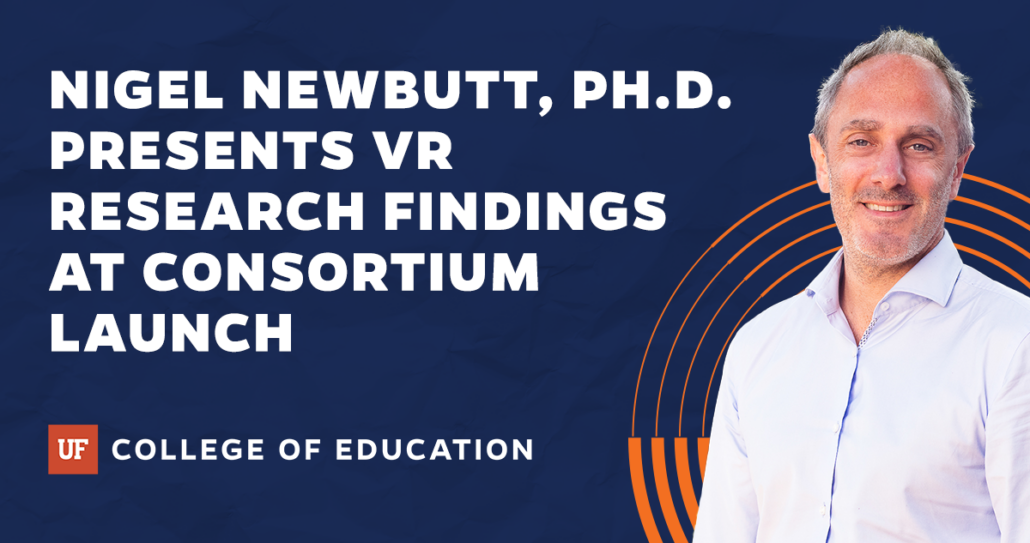[av_three_fourth first min_height=” vertical_alignment=” space=” custom_margin=” margin=’0px’ padding=’0px’ border=” border_color=” radius=’0px’ background_color=” src=” background_position=’top left’ background_repeat=’no-repeat’ animation=” mobile_display=”]
[av_textblock size=” font_color=” color=”]
Nigel Newbutt, Assistant Professor of Advanced Learning Technologies, was selected to speak at a UK virtual launch event for the Employability and Life Skills for SEN Learners Consortium. His presentation focused on the implementation of Virtual Reality (VR) in classrooms for neurodiverse students, specifically those on the autism spectrum. Newbutt works directly with Special Needs Education (SEN) learners. He is the Director of the Equitable Learning Technology Lab (ELTL) in the Institute for Advanced Learning Technologies, and his research is aligned directly with the consortium’s goals.
During his talk, Newbutt emphasized that despite initial concerns regarding sensory overload while using VR headsets, studies have demonstrated a positive impact of VR technology on academic, technological and social skill development among this population.
“Our research shows that autistic people don’t have an aversion to wearing technology,” said Newbutt. “Once they wore it, they were kind of in their own environment; in space where they have the opportunity to practice and test things out without real-life consequences.”
Newbutt highlighted both the opportunities and challenges of implementing VR in secondary-aged neurodiverse classrooms. He expressed how the consortium’s resources and support are creating opportunities and software to implement this technology.
“I think we’ve never seen a time that’s better to be doing this,” said Newbutt. “Putting technologies into educational spaces has its challenges, but I think based on the consortium attendees and on what I know from the UK and the US landscape, there’s a huge willingness to give this a good go and to really think about our students and how they can benefit from this.”
The presentation resonated deeply with attendees, offering practical insights on integrating VR technology into special education curricula. By harnessing VR’s capabilities, educators can create engaging learning experiences that cater to diverse learning styles.
“This is a growing population. In the US, one in 36 people are autistic, and one in 54 in the UK,” said Newbutt. “I think, and research shows, this technology is such a great fit and great space for these people to learn a range of skills, knowledge and opportunities.”
As awareness grows and research advances, the future looks promising for VR-assisted education, particularly in supporting the unique needs of autistic learners. Newbutt’s compelling presentation for the consortium serves as a catalyst for continued exploration and innovation in the field. A recording of the webinar is available via the Metaverse Learning website.
[/av_textblock]
[/av_three_fourth]
[av_one_fourth min_height=” vertical_alignment=” space=” custom_margin=” margin=’0px’ padding=’0px’ border=” border_color=” radius=’0px’ background_color=” src=” background_position=’top left’ background_repeat=’no-repeat’ animation=” mobile_display=”]
[av_image src=’https://education.ufl.edu/news/files/2024/04/IMG_8869-300×169.jpg’ attachment=’21912′ attachment_size=’medium’ align=’center’ styling=” hover=” target=” caption=” font_size=” appearance=” overlay_opacity=’0.4′ overlay_color=’#000000′ overlay_text_color=’#ffffff’ animation=’no-animation’][/av_image]
[av_hr class=’custom’ height=’50’ shadow=’no-shadow’ position=’center’ custom_border=’av-border-thin’ custom_width=’50px’ custom_border_color=” custom_margin_top=’0px’ custom_margin_bottom=’0px’ icon_select=’yes’ custom_icon_color=’#fa4616′ icon=’ue883′ font=’entypo-fontello’]
[av_textblock size=” font_color=” color=”]
Nigel Newbutt, Ph.D.
[/av_textblock]
[/av_one_fourth]
